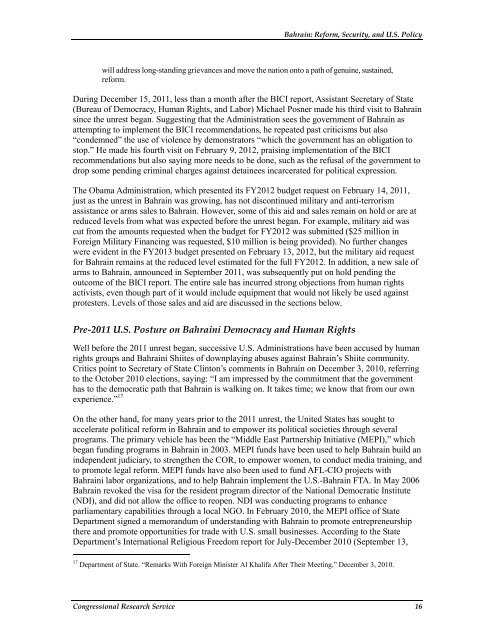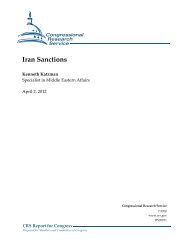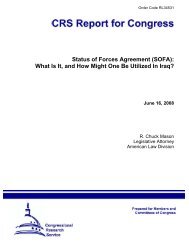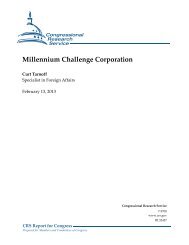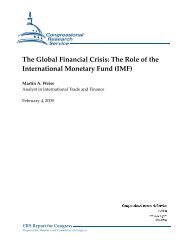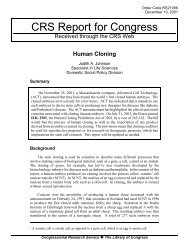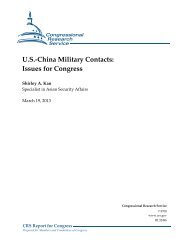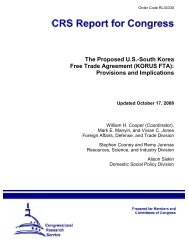Bahrain: Reform, Security, and U.S. Policy - Foreign Press Centers
Bahrain: Reform, Security, and U.S. Policy - Foreign Press Centers
Bahrain: Reform, Security, and U.S. Policy - Foreign Press Centers
Create successful ePaper yourself
Turn your PDF publications into a flip-book with our unique Google optimized e-Paper software.
<strong>Bahrain</strong>: <strong>Reform</strong>, <strong>Security</strong>, <strong>and</strong> U.S. <strong>Policy</strong><br />
will address long-st<strong>and</strong>ing grievances <strong>and</strong> move the nation onto a path of genuine, sustained,<br />
reform.<br />
During December 15, 2011, less than a month after the BICI report, Assistant Secretary of State<br />
(Bureau of Democracy, Human Rights, <strong>and</strong> Labor) Michael Posner made his third visit to <strong>Bahrain</strong><br />
since the unrest began. Suggesting that the Administration sees the government of <strong>Bahrain</strong> as<br />
attempting to implement the BICI recommendations, he repeated past criticisms but also<br />
“condemned” the use of violence by demonstrators “which the government has an obligation to<br />
stop.” He made his fourth visit on February 9, 2012, praising implementation of the BICI<br />
recommendations but also saying more needs to be done, such as the refusal of the government to<br />
drop some pending criminal charges against detainees incarcerated for political expression.<br />
The Obama Administration, which presented its FY2012 budget request on February 14, 2011,<br />
just as the unrest in <strong>Bahrain</strong> was growing, has not discontinued military <strong>and</strong> anti-terrorism<br />
assistance or arms sales to <strong>Bahrain</strong>. However, some of this aid <strong>and</strong> sales remain on hold or are at<br />
reduced levels from what was expected before the unrest began. For example, military aid was<br />
cut from the amounts requested when the budget for FY2012 was submitted ($25 million in<br />
<strong>Foreign</strong> Military Financing was requested, $10 million is being provided). No further changes<br />
were evident in the FY2013 budget presented on February 13, 2012, but the military aid request<br />
for <strong>Bahrain</strong> remains at the reduced level estimated for the full FY2012. In addition, a new sale of<br />
arms to <strong>Bahrain</strong>, announced in September 2011, was subsequently put on hold pending the<br />
outcome of the BICI report. The entire sale has incurred strong objections from human rights<br />
activists, even though part of it would include equipment that would not likely be used against<br />
protesters. Levels of those sales <strong>and</strong> aid are discussed in the sections below.<br />
Pre-2011 U.S. Posture on <strong>Bahrain</strong>i Democracy <strong>and</strong> Human Rights<br />
Well before the 2011 unrest began, successive U.S. Administrations have been accused by human<br />
rights groups <strong>and</strong> <strong>Bahrain</strong>i Shiites of downplaying abuses against <strong>Bahrain</strong>’s Shiite community.<br />
Critics point to Secretary of State Clinton’s comments in <strong>Bahrain</strong> on December 3, 2010, referring<br />
to the October 2010 elections, saying: “I am impressed by the commitment that the government<br />
has to the democratic path that <strong>Bahrain</strong> is walking on. It takes time; we know that from our own<br />
experience.” 17<br />
On the other h<strong>and</strong>, for many years prior to the 2011 unrest, the United States has sought to<br />
accelerate political reform in <strong>Bahrain</strong> <strong>and</strong> to empower its political societies through several<br />
programs. The primary vehicle has been the “Middle East Partnership Initiative (MEPI),” which<br />
began funding programs in <strong>Bahrain</strong> in 2003. MEPI funds have been used to help <strong>Bahrain</strong> build an<br />
independent judiciary, to strengthen the COR, to empower women, to conduct media training, <strong>and</strong><br />
to promote legal reform. MEPI funds have also been used to fund AFL-CIO projects with<br />
<strong>Bahrain</strong>i labor organizations, <strong>and</strong> to help <strong>Bahrain</strong> implement the U.S.-<strong>Bahrain</strong> FTA. In May 2006<br />
<strong>Bahrain</strong> revoked the visa for the resident program director of the National Democratic Institute<br />
(NDI), <strong>and</strong> did not allow the office to reopen. NDI was conducting programs to enhance<br />
parliamentary capabilities through a local NGO. In February 2010, the MEPI office of State<br />
Department signed a memor<strong>and</strong>um of underst<strong>and</strong>ing with <strong>Bahrain</strong> to promote entrepreneurship<br />
there <strong>and</strong> promote opportunities for trade with U.S. small businesses. According to the State<br />
Department’s International Religious Freedom report for July-December 2010 (September 13,<br />
17 Department of State. “Remarks With <strong>Foreign</strong> Minister Al Khalifa After Their Meeting.” December 3, 2010.<br />
Congressional Research Service 16


